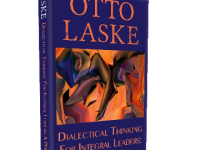Warum nicht mit alten Vorurteilen brechen die aus der positivistischen Tradition stammen und alle im Flachland landen? Dazu ist im Zeitalter des distributed leadership mehr Anlass als je. Die alten Kompetenzschablonen sind tot, und nun wie weiter? Vielleicht hülfe es, sich zu erinnern dass Menschen sich ihr ganzes Leben lang entwickeln? Das würde auf die Erwahcsenenforschungen führen, die in diesem Buch von Otto Laske (übersetzt von Rainer v. Leoprechting 2010) dazu verwandt werden, neue Einsichten und Werkzeuge in die Weisen des Umgangs mit ‘human resources’ einzuführen. Das Buch zeigt die Stufen der lebenslangen Entwicklung der persönlichen Erfahrungen, die jeder in seiner Arbeit und seinem Leben macht, und die zu stets grösserer innerer Freiheit und Selbständigkeit führen. Das Buch gibt dazu neue Werkzeuge an die Hand und zeigt auch, wie man über die Verwandlung der Arbeit durch neue, z. B. holakratische Umgebunglen, nachdenken sollte. Humanpotenziale erkennen, wecken, und messen: Pay Pal Dazu Weiteres auf: Gateway auf deutsch Read More...
Category: Developmental Coaching
Invitation pour les consultants et coach français de renouveller leur profession
Comment les consultants et coach francais peuvent-ils renouveller leur profession utilisant le CDF (Constructive Developmental Framework)? https://www.paypal.com/webapps/hermes?token=5MN6985866069092K&useraction=commit&mfid=1488977403882_1d069d5a8c123#/checkout/login C’est là la question qui se pose se livre sur la découverte du potential humain, allant plus loin que les abstractions des sciences sociales contemporaines. En recherchant de nouvelles clefs pour l’engagement de l’adulte dans le processus de développement (non seulement dans les organizations commerciales), ce livre ouvre la voie a l’évolution du professional aussi bien que de l’être humain. C’est un livre important pour tous les professionnels qui accompagnent les adultes dans leur croissance et la réalisatin de leur potential, introduisant a la fois une perception profonde des “clients” ainsi qu’une réflexion sur soi-même. Dans cette facon, le livre peut induire chez soi une transformation profonde de son être, donnant un nouvel élan dans sa vie professionnelle ainsi que privée. Vour pourrez réévaluer tout ce que vous avez appris jusqu’a maintenant d’un point de vue tres personnel, et aurez l’opportunité d’analyser votre propre développement. Programme Francais CDF Philips-Laske 2009 Read More...
Human Developmental Processes as Key to Creating Impactful Leadership
Copyright 2016 by Graham Boyd & Otto Laske In this article, the authors put forth a new approach to distributed leadership based on research in adult development and the pedagogical thought of Vygotsky, originator of the notion of zones of proximal development. The article attempts to re-totalize the issues neglected, or fragmented, by theories of holacracy and other models of shared leadership, in order to arrive at a deeper understanding of contemporary attempts to redesign organizational work in the direction of “organizations without managerial hierarchies”. In so doing, the authors leave behind present notions of “individual coaching”, “team coaching”, “managerial hierarchy”, and “organizational behavior”, among others, focusing squarely on contributors’ frame of reference (FoR; world view) that determines how they put their capabilities to work collaboratively and what their needs for developmental support are. The article’s essential argument is summarized in Tables 2a and 2b, one for each dimension of adult development. The authors come to the conclusion that for holacracy and similar models to succeed, much more attention must be paid to the fact that unconventional organization designs challenge contributors’ self-identity and psychological well-being. They also show that a one-sided focus on tasks and competences (Task House) is counter-productive... Read More...
Merging Behavioral and Developmental Practices: An Integral Framework for Deep Listening and Thinking
In this paper, the authors (Otto Laske, Alessandro Rossi) lay out a practical approach to integral counseling (part A) and consulting to teams (part B), based on the Constructive Developmental Framework (CDF). The main topic is how to combine interventions for strengthening developmental level and cognitive fluidity, seen as intrinsically related as well as mingled in practice. CDF tools are described as prompts that trigger evidence about the frame of reference based on which clients and teams think, feel, and make decisions. Theoretically, the proposed framework includes and transcends both Wilber’s quadrants and Bhaskar’s moments of dialectic, showing a path toward integral constellations work for which teachable and learnable pragmatic tools are presently hard to find. A Developmental Framework for Deep Listening and Thinking Read More...
Contributions to Evidence Based Developmental Coaching
This article describes a constructivist approach to coaching based on the Constructive Developmental Framework (CDF). Such coaching is evidence based, i.e., based on empirical assessments of coachees prior to actual coaching. Coaching plans are based on empirical findings about coachees' present frame of reference (the way they see the world), meant to guide them toward a more lucid understanding of themselves and their work, and toward more complex thinking. The article appeared in the International Review of Coaching Psychology, London, UK, in 2007, and is here reprinted because it helps behavioral coaches understand the limitations of their professional work. Contributions of Evidence Based Coaching 2007 Read More...
Executive Development as Adult Development
This article, chapter 9 of Demick et al’s Handbook of Adult Development (Springer 2002), tries to escape the tunnel vision of organizational theorists and consultants alike who, while glorifying leaders, cannot penetrate to the adult-developmental origins of leadership and get lost in psychological or spiritual speculations, or else lists of competences. Instead, the article adopts the distinction between "ontic" and "agentic" development, that is, the development that happens over human resources' life span development, on one hand, and the organizational mechanisms put in place to "develop" them, on the other. The article conceptualizes executive development as a lawful developmental modification of an individual's professional agenda and universe of discourse in the cognitive and social-emotional sense or, to speak with E. Jaques, his/her Size of Person. Refining Argyris, three levels of professional agenda are distinguished. M. W. McCall Jr.'s (1998) and D. T. Hall's writings (1996) are focused on in order to clarify contemporary theorists' views, referring to McCall's "five dilemmas" of human development in organizations. The article focuses on the dialectic of managerial strengths and weaknesses, the organizational shift to the "Proteian" (internal) career, and introduces Kegan's and Basseches' work alongside with empirical findings of the author. Laske, Executive Development... Read More...

